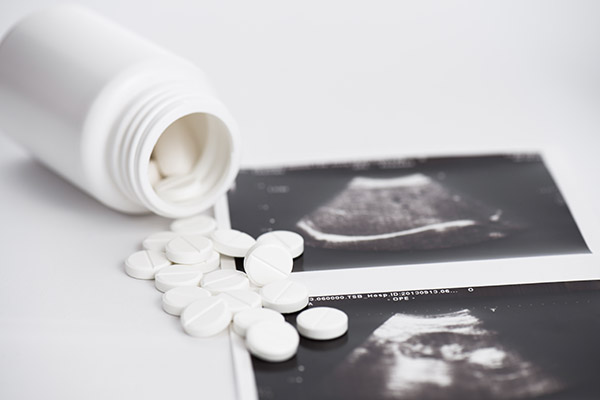ABORTION PILL AND RU-486
RU 486 (more commonly known as “the Abortion Pill”) is a combination of two pills prescribed by a physician to terminate a pregnancy up to 10 weeks gestation (or up to 70 days after the first day of the last menstrual period).
The first medication taken is called mifepristone. Mifepristone is a drug that blocks the hormone progesterone, which is necessary for a pregnancy to continue. The lining of the uterus begins to thin and the embryo cannot stay implanted. It may be taken while in your doctor’s office or at home.
The second medication is called misoprostol. Misoprostol is taken at home usually 24-48 hours after the mifepristone. The Misoprostol will cause the uterus to cramp and contract in order to expel the contents of the uterus.
Taking the Misoprostol should not be considered the end of the process. It’s incredibly important to follow up with your physician after taking both medications, as it is not 100% effective and the abortion may have “failed.” Additionally, for your overall health and well-being, you should receive a physical evaluation to ensure there are no remaining contents in your uterus, infection or other serious complication.
We do not provide abortion services or referrals. We provide free medical verification of pregnancy.

What are the side effects of taking the Abortion Pill?
- Cramping and bleeding are expected. There is a risk of more intensive vaginal bleeding that requires a physician’s care.
- Other common side effects: nausea, vomiting, weakness, fever/chills, headache, diarrhea, dizziness
- You may experience feelings that swing from relief to guilt. Please contact us if you are struggling emotionally from having an abortion, and we can connect you with a support system.
Are there any possible serious or adverse effects of taking the Abortion Pill?
- As mentioned above, heavy bleeding may require a physician’s care. If you are soaking two or more pads an hour for two hours, that’s an indication that you are bleeding excessively.
- The possibility of the abortion being incomplete. If this happens, you need to be prepared for what you would choose to do: continue the pregnancy, or receive a surgical abortion.
- Infections are also possible. Monitor your body closely after you have taken the mifepristone and misoprostol checking for possible signs of infection. Symptoms may include a fever lasting more than 24 hours, severe abdominal or back pain, or foul-smelling vaginal discharge.
- It is rare, but there have been deaths reported after taking the Abortion Pill (including undiagnosed ectopic pregnancies). Please seek immediate medical attention if you have any concerns at all.
How much do abortions cost?
The cost varies greatly depending on many factors: where you’re located, your insurance, and the type of abortion you’re having. According to an LA Times article, “The cost of an abortion rises as a pregnancy progresses. A medical abortion, in which pills are used to terminate a pregnancy, costs California patients an average of $306 out of pocket, according to the agency’s analysis, but isn’t available after 10 weeks. After that, the only option is a surgical abortion, which costs an average of $887 out of pocket in California.”**
Is this the same as Plan B, or the Morning-After Pill?
No. The Abortion Pill will terminate an existing pregnancy with an embryo embedded in the uterus. The Morning-After Pill (of which Plan B is a specific type/brand) should only be used as directed with the purpose of preventing a pregnancy from occurring and will not terminate an existing pregnancy.
Can I get pregnant again right after having an abortion?
Yes! It’s incredibly important to know that you can ovulate shortly after an abortion—as soon as 2 weeks later.* That means you could get pregnant before your next menstrual period shows up. If you are planning on engaging in sexual activity, speak with your physician about options for consideration.
What if I take the first Abortion Pill and change my mind. Can the abortion be reversed?
Timing is everything. Some pregnancies have been recovered after taking mifepristone through the use of progesterone. If you are unsure and are doubting whether the abortion is in fact right for you, please contact us as soon as possible so we may connect you with a physician who offers that service. Time is of the essence, and the sooner you begin taking progesterone, the better.
